PUBH630: Analyzing Determinants of Health in Indigenous Communities
VerifiedAdded on 2023/03/31
|6
|1217
|352
Essay
AI Summary
This essay provides a reflective analysis of the determinants of health for Indigenous Australians, focusing on the historical and contemporary factors that contribute to health inequities. It discusses the impact of colonization, discrimination, and socioeconomic challenges faced by Aboriginal and Torres Strait Islander communities. The essay explores the role of human rights frameworks and legal mechanisms in addressing health disparities, while also acknowledging the ongoing gaps in health outcomes between Indigenous and non-Indigenous populations. The author reflects on their personal understanding and evolving perspectives regarding Indigenous health issues, emphasizing the need for continued efforts to promote health equity and social justice. Desklib offers a variety of resources for students including solved assignments and past papers.
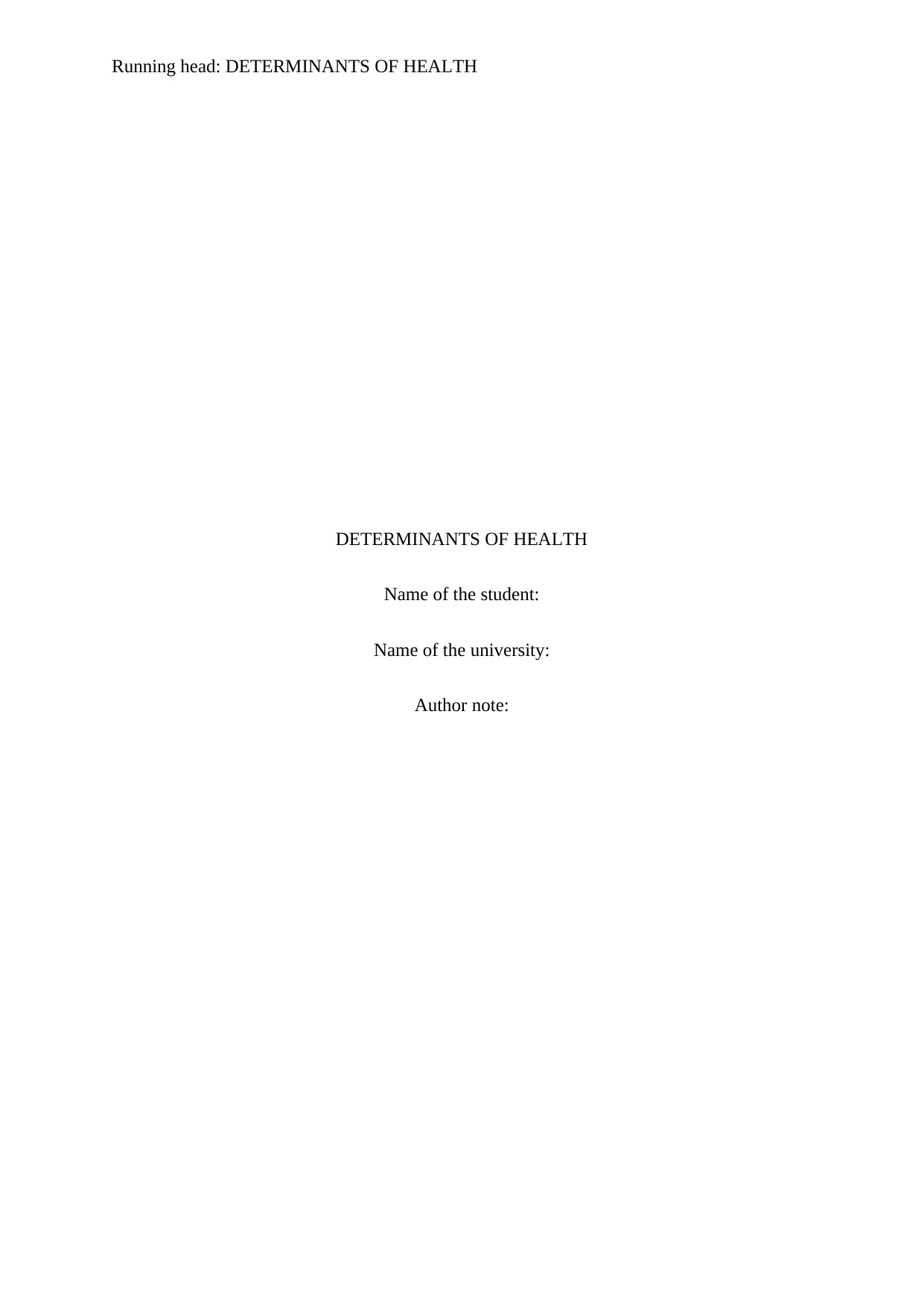
Running head: DETERMINANTS OF HEALTH
DETERMINANTS OF HEALTH
Name of the student:
Name of the university:
Author note:
DETERMINANTS OF HEALTH
Name of the student:
Name of the university:
Author note:
Paraphrase This Document
Need a fresh take? Get an instant paraphrase of this document with our AI Paraphraser
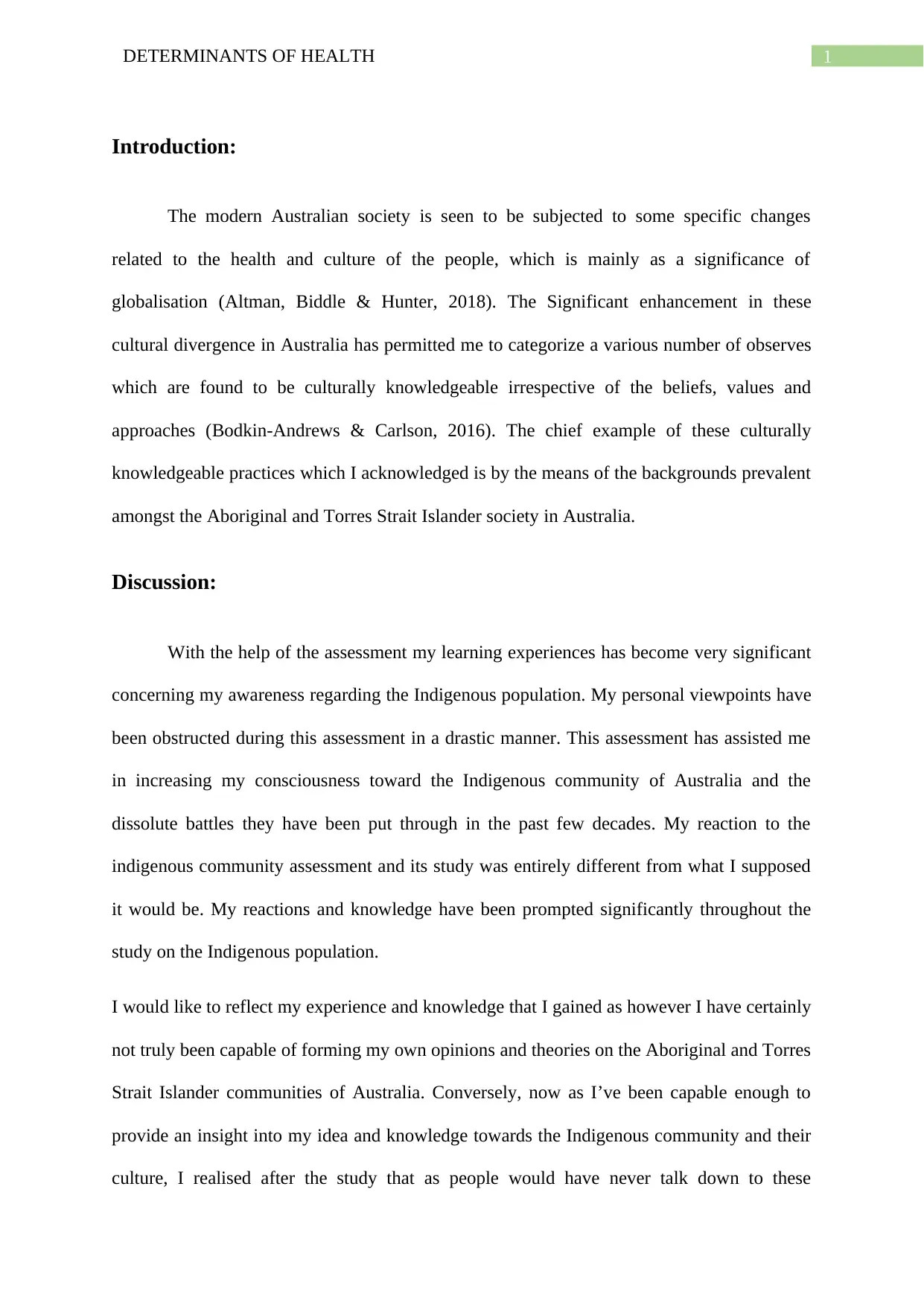
1DETERMINANTS OF HEALTH
Introduction:
The modern Australian society is seen to be subjected to some specific changes
related to the health and culture of the people, which is mainly as a significance of
globalisation (Altman, Biddle & Hunter, 2018). The Significant enhancement in these
cultural divergence in Australia has permitted me to categorize a various number of observes
which are found to be culturally knowledgeable irrespective of the beliefs, values and
approaches (Bodkin-Andrews & Carlson, 2016). The chief example of these culturally
knowledgeable practices which I acknowledged is by the means of the backgrounds prevalent
amongst the Aboriginal and Torres Strait Islander society in Australia.
Discussion:
With the help of the assessment my learning experiences has become very significant
concerning my awareness regarding the Indigenous population. My personal viewpoints have
been obstructed during this assessment in a drastic manner. This assessment has assisted me
in increasing my consciousness toward the Indigenous community of Australia and the
dissolute battles they have been put through in the past few decades. My reaction to the
indigenous community assessment and its study was entirely different from what I supposed
it would be. My reactions and knowledge have been prompted significantly throughout the
study on the Indigenous population.
I would like to reflect my experience and knowledge that I gained as however I have certainly
not truly been capable of forming my own opinions and theories on the Aboriginal and Torres
Strait Islander communities of Australia. Conversely, now as I’ve been capable enough to
provide an insight into my idea and knowledge towards the Indigenous community and their
culture, I realised after the study that as people would have never talk down to these
Introduction:
The modern Australian society is seen to be subjected to some specific changes
related to the health and culture of the people, which is mainly as a significance of
globalisation (Altman, Biddle & Hunter, 2018). The Significant enhancement in these
cultural divergence in Australia has permitted me to categorize a various number of observes
which are found to be culturally knowledgeable irrespective of the beliefs, values and
approaches (Bodkin-Andrews & Carlson, 2016). The chief example of these culturally
knowledgeable practices which I acknowledged is by the means of the backgrounds prevalent
amongst the Aboriginal and Torres Strait Islander society in Australia.
Discussion:
With the help of the assessment my learning experiences has become very significant
concerning my awareness regarding the Indigenous population. My personal viewpoints have
been obstructed during this assessment in a drastic manner. This assessment has assisted me
in increasing my consciousness toward the Indigenous community of Australia and the
dissolute battles they have been put through in the past few decades. My reaction to the
indigenous community assessment and its study was entirely different from what I supposed
it would be. My reactions and knowledge have been prompted significantly throughout the
study on the Indigenous population.
I would like to reflect my experience and knowledge that I gained as however I have certainly
not truly been capable of forming my own opinions and theories on the Aboriginal and Torres
Strait Islander communities of Australia. Conversely, now as I’ve been capable enough to
provide an insight into my idea and knowledge towards the Indigenous community and their
culture, I realised after the study that as people would have never talk down to these
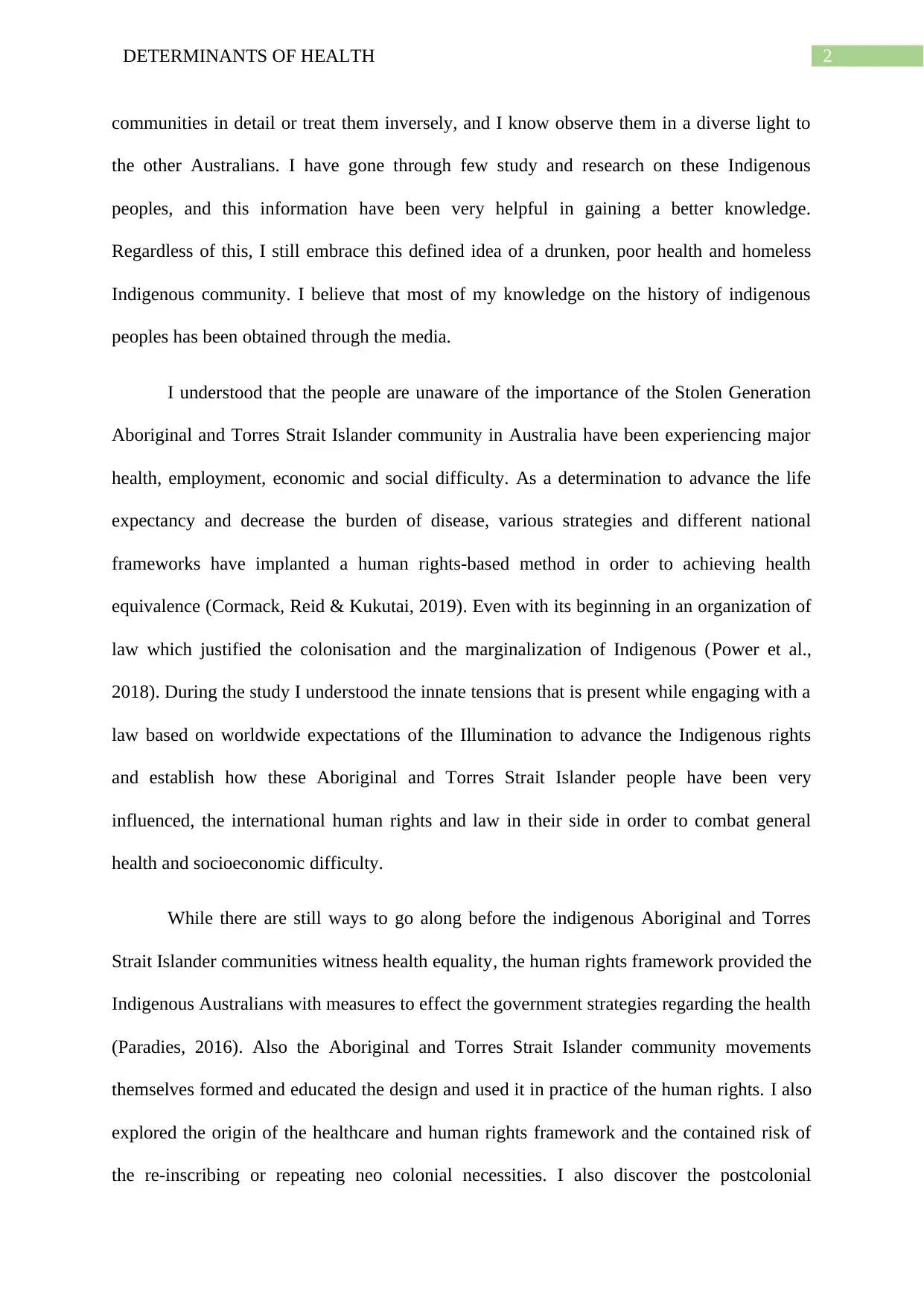
2DETERMINANTS OF HEALTH
communities in detail or treat them inversely, and I know observe them in a diverse light to
the other Australians. I have gone through few study and research on these Indigenous
peoples, and this information have been very helpful in gaining a better knowledge.
Regardless of this, I still embrace this defined idea of a drunken, poor health and homeless
Indigenous community. I believe that most of my knowledge on the history of indigenous
peoples has been obtained through the media.
I understood that the people are unaware of the importance of the Stolen Generation
Aboriginal and Torres Strait Islander community in Australia have been experiencing major
health, employment, economic and social difficulty. As a determination to advance the life
expectancy and decrease the burden of disease, various strategies and different national
frameworks have implanted a human rights-based method in order to achieving health
equivalence (Cormack, Reid & Kukutai, 2019). Even with its beginning in an organization of
law which justified the colonisation and the marginalization of Indigenous (Power et al.,
2018). During the study I understood the innate tensions that is present while engaging with a
law based on worldwide expectations of the Illumination to advance the Indigenous rights
and establish how these Aboriginal and Torres Strait Islander people have been very
influenced, the international human rights and law in their side in order to combat general
health and socioeconomic difficulty.
While there are still ways to go along before the indigenous Aboriginal and Torres
Strait Islander communities witness health equality, the human rights framework provided the
Indigenous Australians with measures to effect the government strategies regarding the health
(Paradies, 2016). Also the Aboriginal and Torres Strait Islander community movements
themselves formed and educated the design and used it in practice of the human rights. I also
explored the origin of the healthcare and human rights framework and the contained risk of
the re-inscribing or repeating neo colonial necessities. I also discover the postcolonial
communities in detail or treat them inversely, and I know observe them in a diverse light to
the other Australians. I have gone through few study and research on these Indigenous
peoples, and this information have been very helpful in gaining a better knowledge.
Regardless of this, I still embrace this defined idea of a drunken, poor health and homeless
Indigenous community. I believe that most of my knowledge on the history of indigenous
peoples has been obtained through the media.
I understood that the people are unaware of the importance of the Stolen Generation
Aboriginal and Torres Strait Islander community in Australia have been experiencing major
health, employment, economic and social difficulty. As a determination to advance the life
expectancy and decrease the burden of disease, various strategies and different national
frameworks have implanted a human rights-based method in order to achieving health
equivalence (Cormack, Reid & Kukutai, 2019). Even with its beginning in an organization of
law which justified the colonisation and the marginalization of Indigenous (Power et al.,
2018). During the study I understood the innate tensions that is present while engaging with a
law based on worldwide expectations of the Illumination to advance the Indigenous rights
and establish how these Aboriginal and Torres Strait Islander people have been very
influenced, the international human rights and law in their side in order to combat general
health and socioeconomic difficulty.
While there are still ways to go along before the indigenous Aboriginal and Torres
Strait Islander communities witness health equality, the human rights framework provided the
Indigenous Australians with measures to effect the government strategies regarding the health
(Paradies, 2016). Also the Aboriginal and Torres Strait Islander community movements
themselves formed and educated the design and used it in practice of the human rights. I also
explored the origin of the healthcare and human rights framework and the contained risk of
the re-inscribing or repeating neo colonial necessities. I also discover the postcolonial
⊘ This is a preview!⊘
Do you want full access?
Subscribe today to unlock all pages.

Trusted by 1+ million students worldwide
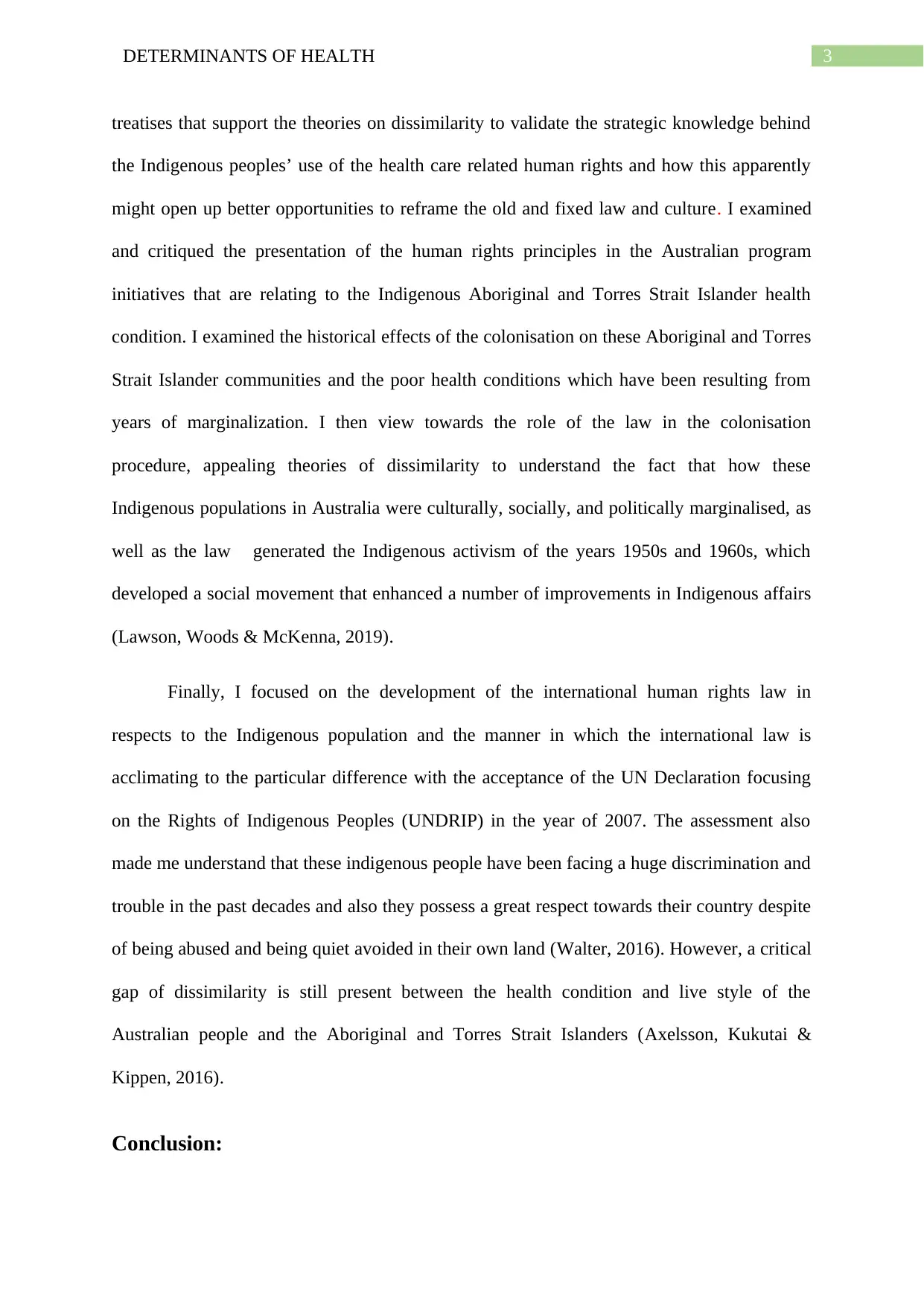
3DETERMINANTS OF HEALTH
treatises that support the theories on dissimilarity to validate the strategic knowledge behind
the Indigenous peoples’ use of the health care related human rights and how this apparently
might open up better opportunities to reframe the old and fixed law and culture. I examined
and critiqued the presentation of the human rights principles in the Australian program
initiatives that are relating to the Indigenous Aboriginal and Torres Strait Islander health
condition. I examined the historical effects of the colonisation on these Aboriginal and Torres
Strait Islander communities and the poor health conditions which have been resulting from
years of marginalization. I then view towards the role of the law in the colonisation
procedure, appealing theories of dissimilarity to understand the fact that how these
Indigenous populations in Australia were culturally, socially, and politically marginalised, as
well as the law generated the Indigenous activism of the years 1950s and 1960s, which
developed a social movement that enhanced a number of improvements in Indigenous affairs
(Lawson, Woods & McKenna, 2019).
Finally, I focused on the development of the international human rights law in
respects to the Indigenous population and the manner in which the international law is
acclimating to the particular difference with the acceptance of the UN Declaration focusing
on the Rights of Indigenous Peoples (UNDRIP) in the year of 2007. The assessment also
made me understand that these indigenous people have been facing a huge discrimination and
trouble in the past decades and also they possess a great respect towards their country despite
of being abused and being quiet avoided in their own land (Walter, 2016). However, a critical
gap of dissimilarity is still present between the health condition and live style of the
Australian people and the Aboriginal and Torres Strait Islanders (Axelsson, Kukutai &
Kippen, 2016).
Conclusion:
treatises that support the theories on dissimilarity to validate the strategic knowledge behind
the Indigenous peoples’ use of the health care related human rights and how this apparently
might open up better opportunities to reframe the old and fixed law and culture. I examined
and critiqued the presentation of the human rights principles in the Australian program
initiatives that are relating to the Indigenous Aboriginal and Torres Strait Islander health
condition. I examined the historical effects of the colonisation on these Aboriginal and Torres
Strait Islander communities and the poor health conditions which have been resulting from
years of marginalization. I then view towards the role of the law in the colonisation
procedure, appealing theories of dissimilarity to understand the fact that how these
Indigenous populations in Australia were culturally, socially, and politically marginalised, as
well as the law generated the Indigenous activism of the years 1950s and 1960s, which
developed a social movement that enhanced a number of improvements in Indigenous affairs
(Lawson, Woods & McKenna, 2019).
Finally, I focused on the development of the international human rights law in
respects to the Indigenous population and the manner in which the international law is
acclimating to the particular difference with the acceptance of the UN Declaration focusing
on the Rights of Indigenous Peoples (UNDRIP) in the year of 2007. The assessment also
made me understand that these indigenous people have been facing a huge discrimination and
trouble in the past decades and also they possess a great respect towards their country despite
of being abused and being quiet avoided in their own land (Walter, 2016). However, a critical
gap of dissimilarity is still present between the health condition and live style of the
Australian people and the Aboriginal and Torres Strait Islanders (Axelsson, Kukutai &
Kippen, 2016).
Conclusion:
Paraphrase This Document
Need a fresh take? Get an instant paraphrase of this document with our AI Paraphraser
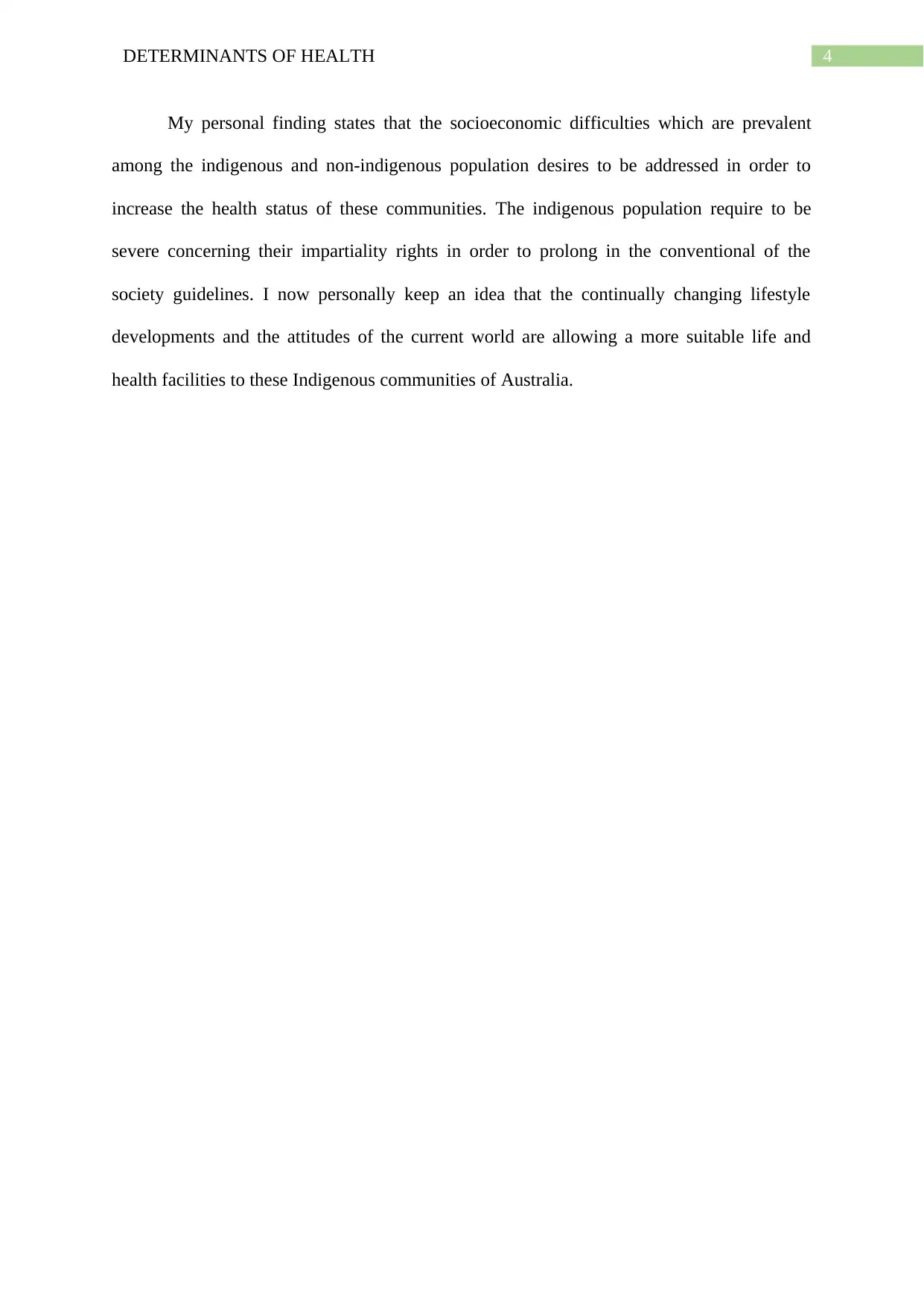
4DETERMINANTS OF HEALTH
My personal finding states that the socioeconomic difficulties which are prevalent
among the indigenous and non-indigenous population desires to be addressed in order to
increase the health status of these communities. The indigenous population require to be
severe concerning their impartiality rights in order to prolong in the conventional of the
society guidelines. I now personally keep an idea that the continually changing lifestyle
developments and the attitudes of the current world are allowing a more suitable life and
health facilities to these Indigenous communities of Australia.
My personal finding states that the socioeconomic difficulties which are prevalent
among the indigenous and non-indigenous population desires to be addressed in order to
increase the health status of these communities. The indigenous population require to be
severe concerning their impartiality rights in order to prolong in the conventional of the
society guidelines. I now personally keep an idea that the continually changing lifestyle
developments and the attitudes of the current world are allowing a more suitable life and
health facilities to these Indigenous communities of Australia.
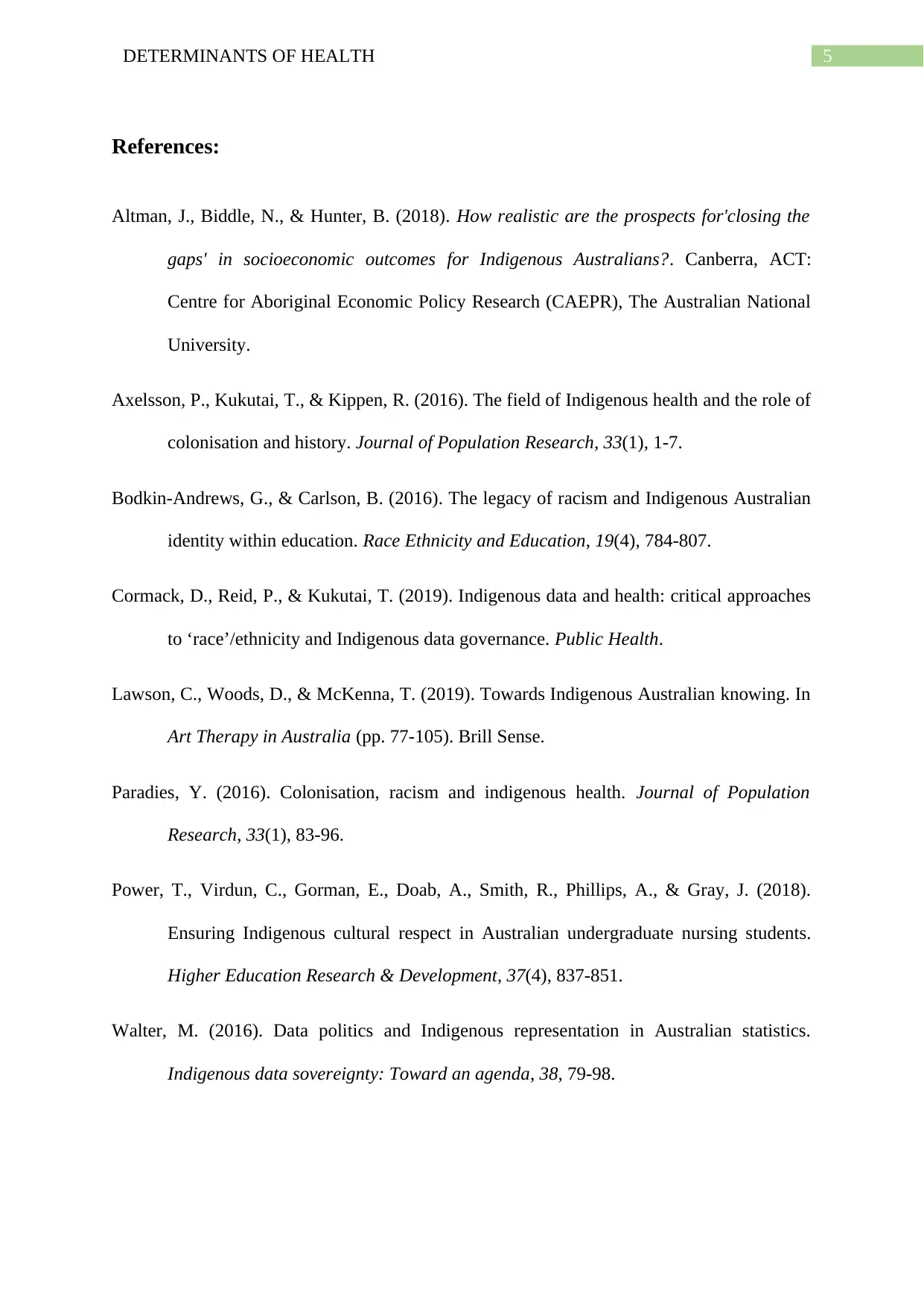
5DETERMINANTS OF HEALTH
References:
Altman, J., Biddle, N., & Hunter, B. (2018). How realistic are the prospects for'closing the
gaps' in socioeconomic outcomes for Indigenous Australians?. Canberra, ACT:
Centre for Aboriginal Economic Policy Research (CAEPR), The Australian National
University.
Axelsson, P., Kukutai, T., & Kippen, R. (2016). The field of Indigenous health and the role of
colonisation and history. Journal of Population Research, 33(1), 1-7.
Bodkin-Andrews, G., & Carlson, B. (2016). The legacy of racism and Indigenous Australian
identity within education. Race Ethnicity and Education, 19(4), 784-807.
Cormack, D., Reid, P., & Kukutai, T. (2019). Indigenous data and health: critical approaches
to ‘race’/ethnicity and Indigenous data governance. Public Health.
Lawson, C., Woods, D., & McKenna, T. (2019). Towards Indigenous Australian knowing. In
Art Therapy in Australia (pp. 77-105). Brill Sense.
Paradies, Y. (2016). Colonisation, racism and indigenous health. Journal of Population
Research, 33(1), 83-96.
Power, T., Virdun, C., Gorman, E., Doab, A., Smith, R., Phillips, A., & Gray, J. (2018).
Ensuring Indigenous cultural respect in Australian undergraduate nursing students.
Higher Education Research & Development, 37(4), 837-851.
Walter, M. (2016). Data politics and Indigenous representation in Australian statistics.
Indigenous data sovereignty: Toward an agenda, 38, 79-98.
References:
Altman, J., Biddle, N., & Hunter, B. (2018). How realistic are the prospects for'closing the
gaps' in socioeconomic outcomes for Indigenous Australians?. Canberra, ACT:
Centre for Aboriginal Economic Policy Research (CAEPR), The Australian National
University.
Axelsson, P., Kukutai, T., & Kippen, R. (2016). The field of Indigenous health and the role of
colonisation and history. Journal of Population Research, 33(1), 1-7.
Bodkin-Andrews, G., & Carlson, B. (2016). The legacy of racism and Indigenous Australian
identity within education. Race Ethnicity and Education, 19(4), 784-807.
Cormack, D., Reid, P., & Kukutai, T. (2019). Indigenous data and health: critical approaches
to ‘race’/ethnicity and Indigenous data governance. Public Health.
Lawson, C., Woods, D., & McKenna, T. (2019). Towards Indigenous Australian knowing. In
Art Therapy in Australia (pp. 77-105). Brill Sense.
Paradies, Y. (2016). Colonisation, racism and indigenous health. Journal of Population
Research, 33(1), 83-96.
Power, T., Virdun, C., Gorman, E., Doab, A., Smith, R., Phillips, A., & Gray, J. (2018).
Ensuring Indigenous cultural respect in Australian undergraduate nursing students.
Higher Education Research & Development, 37(4), 837-851.
Walter, M. (2016). Data politics and Indigenous representation in Australian statistics.
Indigenous data sovereignty: Toward an agenda, 38, 79-98.
⊘ This is a preview!⊘
Do you want full access?
Subscribe today to unlock all pages.

Trusted by 1+ million students worldwide
1 out of 6
Related Documents
Your All-in-One AI-Powered Toolkit for Academic Success.
+13062052269
info@desklib.com
Available 24*7 on WhatsApp / Email
![[object Object]](/_next/static/media/star-bottom.7253800d.svg)
Unlock your academic potential
Copyright © 2020–2026 A2Z Services. All Rights Reserved. Developed and managed by ZUCOL.





